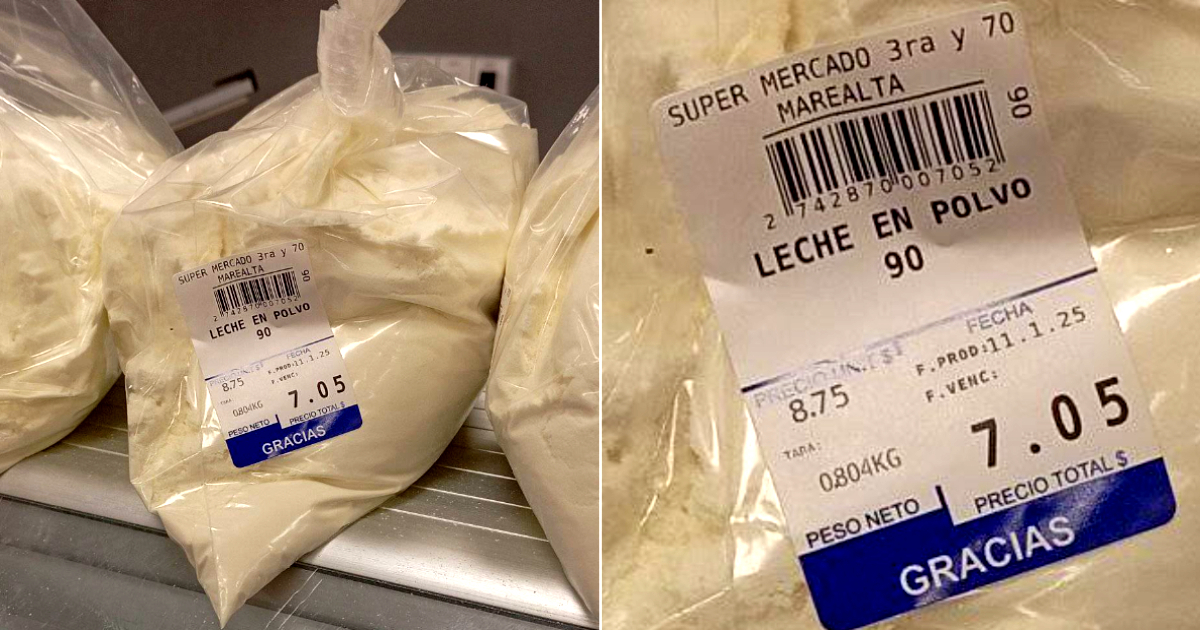The reemergence of powdered milk in Havana's dollar-exclusive supermarkets has ignited a fervent debate on social media and among everyday Cubans, highlighting the ramifications of the island's economic dollarization. This incident took place at the controversial store on 3rd and 70th in Miramar, where shoppers reported finding the product, albeit at steep prices and under questionable circumstances, such as suspicious repackaging.
The Context of Dollarization and Product Availability
In recent years, the Cuban government has increased sales in freely convertible currency (MLC) as a strategy to gather foreign exchange amid a severe economic crisis. However, the recent sanctioning of "partial dollarization of the economy" (ironically to "de-dollarize" according to Prime Minister Manuel Marrero Cruz) has resulted in essential items like powdered milk being available exclusively in dollar-only stores, while remaining scarce in markets that deal in Cuban pesos or even in those accepting MLC.
This pattern isn't unfamiliar. In 2022, the regime announced that domestic powdered milk production would be prioritized for stores operating in MLC, justifying it as a necessary measure to finance imports. Nonetheless, this approach has heightened inequalities, leaving a significant portion of the population without access to basic goods due to a lack of dollars. Aware of the public repercussions, the government strives to conceal the existence of stores selling powdered milk for foreign currency.
Consumer Accounts and Online Complaints
The reappearance of powdered milk at the 3rd and 70th store was met with a blend of surprise and outrage. Social media users pointed out that while children in many households resort to consuming alternatives like syrup, dollar-only stores offer rebranded milk at exorbitant prices.
Another user took to Facebook to recount her experience at the said supermarket, confirming the sale of powdered milk in dollars. “We bought four bottles of water and were charged more than the price listed on the shelves. The bag of powdered milk advertised at $7.75 was billed at $8.75. It’s heartbreaking that a market where Cubans must perform miracles to gather dollars becomes a place where they are openly robbed,” she narrated.
Economic and Political Underpinnings
The sale of powdered milk in dollars is not merely an economic issue but a political one as well. Analysts like Emilio Morales have pointed out that dollarization mainly benefits the military conglomerate GAESA, which controls the MLC stores and over 70% of the country's dollarized economy. This setup aims to centralize foreign currency revenues, which, according to Morales, exacerbates systemic crisis and fuels public dissent.
In December 2024, the government announced that children would receive powdered milk as part of the basic food basket, but the quantities were insufficient to meet demand, leading to the offer of a "prepared" product, reminiscent of other instances where solutions involved syrups.
Simultaneously, basic items like soft drinks and juices reappeared in dollar-only stores, sparking criticism on social media regarding the prioritization of foreign currency markets over the needs of the population using pesos.
Divergent Views
While the ousted Minister of Economy and Planning, Alejandro Gil Fernández, claimed in 2022 that dollarization would ensure the sustainability of certain basic products, many argued this strategy would further marginalize Cubans without dollar access. However, the high prices and irregularities in dollar-only stores have weakened the narrative of the vanished ex-minister and the expectations of success by those who ousted him.
For many, dollarization symbolizes the loss of access to fundamental rights. As one social media user expressed, “Even the ‘Piñata’ soda has reappeared, but in dollars. What about those who don’t have access to this currency?” The resurfacing of powdered milk in dollar-exclusive supermarkets is a testament to the complex and unjust reality faced by Cuba under a regime of "continuity" that seeks to meet basic needs by selling essential goods in a currency that does not pay wages, pensions, or benefit checks.
Understanding Cuba's Economic Challenges
Why is powdered milk only available in dollar stores in Cuba?
The Cuban government has prioritized the sale of essential products like powdered milk in dollar-only stores to gather foreign currency, a strategy amid the island's severe economic crisis.
What impact does dollarization have on Cuban society?
Dollarization has exacerbated inequalities, limiting access to basic goods for those lacking foreign currency, and has fueled public dissatisfaction with the government's economic policies.
How does the Cuban government justify selling essential goods in dollars?
The Cuban government argues that selling goods in dollars is necessary to finance imports and sustain the availability of essential products amid economic challenges.
